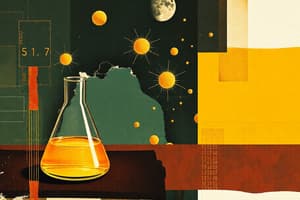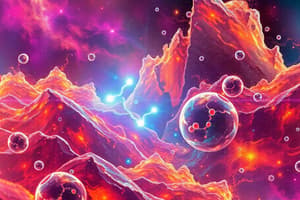Podcast
Questions and Answers
What is a chemical change?
What is a chemical change?
- Affects only the external appearance of a substance
- Involves only a change in temperature
- Causes a substance to turn into a new substance (correct)
- Changes the physical state of a substance
Which type of change involves heat moving out from the system into the surroundings?
Which type of change involves heat moving out from the system into the surroundings?
- Exothermic change (correct)
- Physical change
- Chemical change
- Endothermic change
According to the Law of Conservation of Mass, what remains constant in a chemical reaction?
According to the Law of Conservation of Mass, what remains constant in a chemical reaction?
- Temperature
- Mass (correct)
- Volume
- Density
What are substances called that are broken down by a chemical change?
What are substances called that are broken down by a chemical change?
Which of the following is NOT one of the main states of matter?
Which of the following is NOT one of the main states of matter?
What causes changes in states of matter?
What causes changes in states of matter?
What happens to solids as temperature increases?
What happens to solids as temperature increases?
According to Kinetic Molecular Theory, what is the main reason for the volume that matter occupies?
According to Kinetic Molecular Theory, what is the main reason for the volume that matter occupies?
What is a pure substance that contains only one kind of particle?
What is a pure substance that contains only one kind of particle?
In which state of matter are the particles very spread out and move in straight line, random paths?
In which state of matter are the particles very spread out and move in straight line, random paths?
What is a homogeneous mixture that has 'uniform' composition and one phase?
What is a homogeneous mixture that has 'uniform' composition and one phase?
What is the particle in a mixture that is present in smaller proportions and is dissolved?
What is the particle in a mixture that is present in smaller proportions and is dissolved?
Flashcards are hidden until you start studying
Study Notes
Chemical Change and Heat Transfer
- A chemical change is a transformation resulting in the formation of new substances with different properties.
- An exothermic change involves heat moving out from the system into the surroundings.
Law of Conservation of Mass
- The Law of Conservation of Mass states that the total mass remains constant in a chemical reaction; matter is neither created nor destroyed.
Substances and Chemical Changes
- Substances that are broken down by a chemical change are referred to as reactants.
States of Matter
- The three main states of matter: solid, liquid, gas. Plasma is often considered a fourth state, but some lists may exclude it.
- Changes in states of matter are primarily caused by temperature and pressure variations.
Effect of Temperature on Solids
- As temperature increases, solids typically expand and can transition to a liquid state through melting.
Kinetic Molecular Theory
- According to Kinetic Molecular Theory, the main reason for the volume that matter occupies is the space between particles and their motion.
Pure Substances
- A pure substance contains only one kind of particle, exhibiting consistent properties throughout.
Particle Arrangement in Gases
- In the gaseous state, particles are very spread out and move in straight-line, random paths, allowing for high energy and low density.
Homogeneous Mixtures
- A homogeneous mixture has a uniform composition and consists of only one phase, often referred to as a solution.
Components of Mixtures
- The solute is the particle in a mixture that is present in smaller proportions and is dissolved in the solvent.
Studying That Suits You
Use AI to generate personalized quizzes and flashcards to suit your learning preferences.



